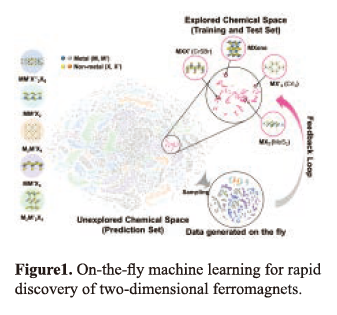Qionghua Zhou1*, Shuaihua Lu, Xinyu Chen, Jinlan Wang2*
1Southeast University, Nanjing, 211189, China
EXTENDED ABSTRACT: Recently, artificial intelligence as a revolutionary technique has attracted worldwide attention in the material design field. Combining the machine learning (ML) algorithms and experimental/computational data, the discovery procedure of new materials has been greatly accelerated. However, the most immediate challenge is lack of material data, especially for complex properties (such as magnetism) and diverse structures (such as two-dimensional materials). To face this challenge,we develope an adaptive ML framework to search the chemical space containing over 2x 105 candidates for two-dimensional ferromagnets (Figure 1). An iterative feedback loop is applied to generate data on-the-fly which improves the sampling efficiency. ML models achieve a prediction accuracy of over 90% on the key ferromagnetic properties and over 700 potential FMmaterials with high Curie temperature are screened out. The second solution to deal with small dataset is transfer-learning. By selecting the effective mass of bulk materials as source domain (which is relatively a big dataset)!the carrier mobility of two-dimensional materials is successfully predicted.Another challenge is the model interpretation of ML. To open the “black box", Shapley additive explanations (SHAP) analysis is applied and a crystal-graph-based descriptor Transformed Atom Vector (TAV) is proposed.
Keywords: machine learning; two-dimensional material; small dataset; model interpretation


Qionghua Zhou has completed his PhD at the age of 30 years from School of Physics, Southeast University. He is associate professor in Southeast University. His main research interests are machine-learning aided material design and two-dimensional materials simulation. He has published more than 40 papers in reputed journals including Nat. Commun., Adv. Mater., Angew. Chem. Int. Ed., and J. Phys. Chem. Lett.